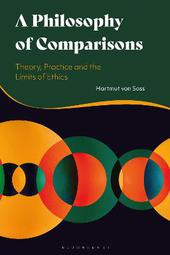
|
A Philosophy of Comparisons: Theory, Practice and the Limits of Ethics
Hardback
Main Details
| Title |
A Philosophy of Comparisons: Theory, Practice and the Limits of Ethics
|
| Authors and Contributors |
By (author) Dr Hartmut von Sass
|
| Physical Properties |
| Format:Hardback | | Pages:264 | | Dimensions(mm): Height 234,Width 156 |
|
| Category/Genre | Analytical philosophy and Logical Positivism
Philosophy - aesthetics |
|---|
| ISBN/Barcode |
9781350184381
|
| Classifications | Dewey:121.4 |
|---|
| Audience | | Professional & Vocational | |
|---|
|
Publishing Details |
| Publisher |
Bloomsbury Publishing PLC
|
| Imprint |
Bloomsbury Academic
|
| Publication Date |
7 October 2021 |
| Publication Country |
United Kingdom
|
Description
Comparing is one of the most essential practices, in our everyday life as well as in science and humanities. In this in-depth philosophical analysis of the structure, practice and ethics of comparative procedures, Hartmut von Sass expands on the significance of comparison. Elucidating the ramified structure of comparing, von Sass suggests a typology of comparisons before introducing the notion of comparative injustice and the limits of comparisons. He elaborates on comparing as practice by relating comparing to three relative practices - orienting, describing, and expressing oneself - to unfold some of the most important chapters of what might be called comparativism. This approach allows von Sass to clarify the idea of the incomparable, distinguish between different versions of incomparability and shed light on important ethical aspects of comparisons today. Confronting the claim that we are living in an age of comparisons, his book is an important contribution to ideas surrounding all-encompassing measurements and scalability and their critique.
Author Biography
Hartmut von Sass is Professor of Systematic Theology and Philosophy of Religion and Heisenberg Scholar at Humboldt University in Berlin, Germany.
ReviewsThis carefully argued and clearly written book is the most thorough study of the meaning and practice of comparing that I am aware of. It draws impressively in a wide range of philosophical literature and traditions as it explains the many roles of making comparisons in our thought and in our culture.' * Douglas MacLean, Professor Emeritus, University of North Carolina Chapel Hill, USA *
|